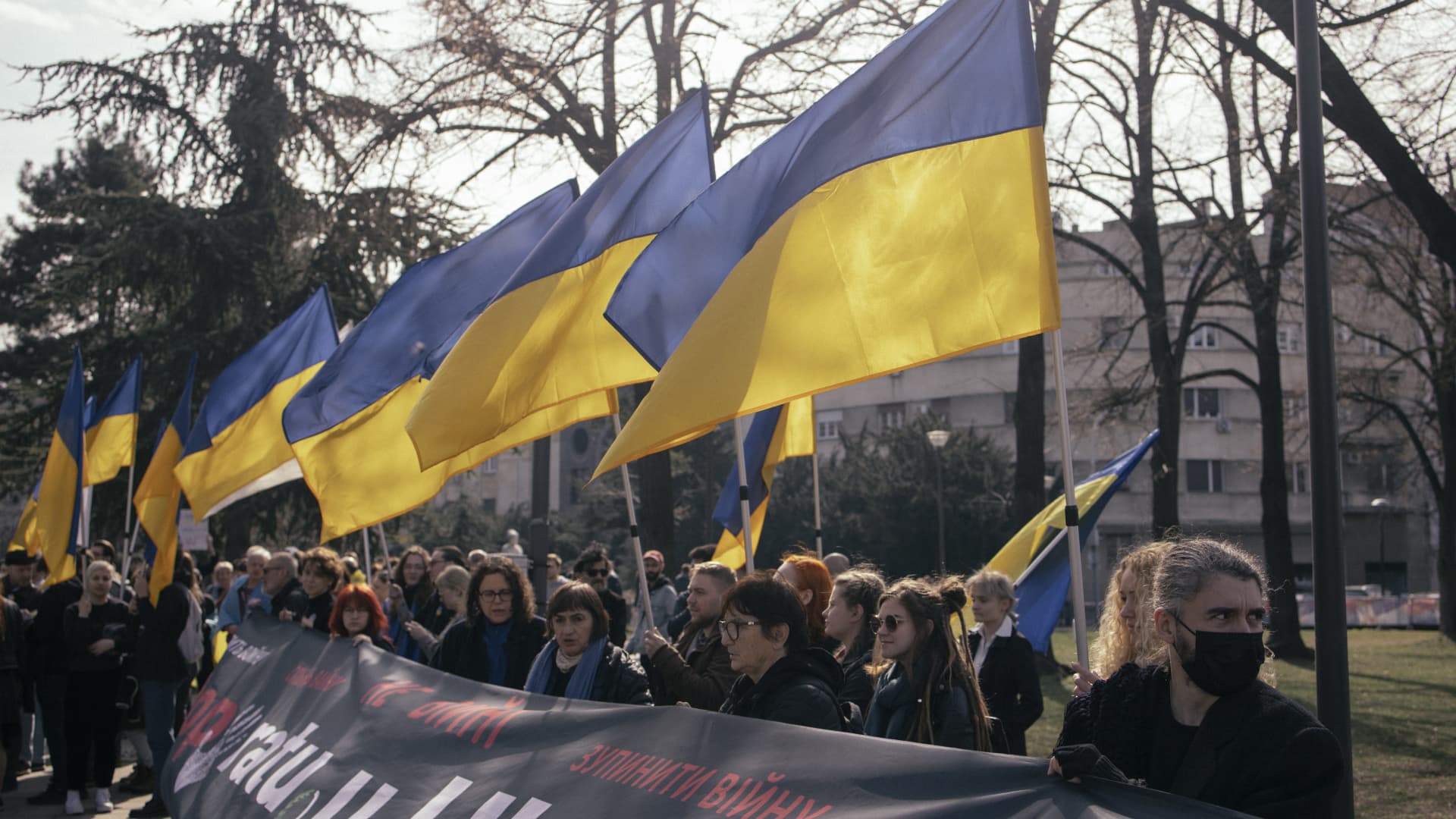
05 Feb In Russia’s backyard of the Balkans, EU enlargement plans are back in focus
People hold a banner and Ukrainian flags during a rally to mark the one-year anniversary of Russia’s invasion of Ukraine on February 24, 2023 in Belgrade, Serbia. As part of the Western Balkans block waiting for EU-membership, Serbia is caught in a geostrategic rivalry between its Western allies and Russia.
Vladimir Zivojinovic | Getty Images News | Getty Images
Davos, SWITZERLAND — As spiking geopolitical tensions thrust the European Union into the spotlight, attention has turned to the strategically important Western Balkans. But whether the neighboring region is ready — and willing — to finally make the steps needed to join the union remains unclear.
The Western Balkans, comprised of Albania, Bosnia and Herzegovina, North Macedonia, Montenegro, Kosovo and Serbia, represent a notable gap in the map of EU membership in southeastern Europe.
Though each has applied for — and been granted — candidate or potential candidate member status over the past two decades following the fall of the socialist federation of Yugoslavia in 1992, progress on accession has been generally slow.
“I see the European Union more ready for the Balkans than the Balkans for the European Union,” Miroslav Lajčák, EU Special Representative for the Belgrade-Pristina Dialogue and Western Balkans, told CNBC last month.
Accession to the bloc is a rigorous and often lengthy process involving several phases of negotiations and reforms to ensure a candidate state meets the EU’s judicial, administrative and economic standards.
Lajčák said that countries in the Western Balkans, in the past, had been hesitant to truly engage in such reforms because they “did not believe in a true European future” — or that they could realistically meet the requirements.
But all that changed with the outbreak of war on Europe’s doorstep in February 2022.
Ukraine and Moldova and Georgia brought a fresh energy and commitment – something that was almost lost in the Balkans.
Miroslav Lajčák
EU Special Representative for the Belgrade-Pristina Dialogue and Western Balkans
Within days of Russia’s invasion, Ukraine, neighboring Moldova and, soon after, nearby Georgia applied for EU candidate status. By late 2023, the EU launched accession talks with Ukraine and Moldova, and granted candidate status to Georgia, adding momentum to the European project and signaling renewed hope for other would-be members.
“Ukraine and Moldova and Georgia brought a fresh energy and commitment – something that was almost lost in the Balkans,” Lajčák said. “Now, it’s very clear that the European Union is serious.”
Though Ukraine, Moldova, and Georgia are outside of the Western Balkans, constituting part of Europe’s former Eastern bloc, Lajčák said that progress should drive the region forward in accession talks. Negotiations are currently underway in every country except Kosovo, a potential candidate member, but Lajčák noted that that openness may not remain indefinitely.
“The train is here and the train will leave the station. If they don’t board, they will miss a huge historic opportunity,” he said.
An atmosphere of EU enlargement
The EU’s accelerated enlargement comes as the bloc seeks to strengthen its assertiveness given Russia’s war in Ukraine and a fracturing of the U.S.-led world order. Lajčák said this has caused the atmosphere in Brussels to become “more political” than in the past.
“Before, it was always said that enlargement means expanding the area where European values and rules apply. Now, it’s seen more geopolitically,” Lajčák said.
“It makes us stronger, it makes us bigger, it makes our market bigger. So it’s less idealistic and more pragmatic.”
It would be economically insane [for European countries] to look elsewhere.
Miroslav Lajčák
EU Special Representative for the Belgrade-Pristina Dialogue and Western Balkans
The heightened political emphasis has made foreign policy alignment more critical than ever to the accession process, with the EU’s unity already vexed by the intransigence of existing member Hungary. That could prove a sticking point for certain prospective members.
Serbia, for instance — the largest country in the region — has been vocal in condemning Russia’s invasion of Ukraine, but has resisted imposing sanctions on the country. Indeed, Belgrade has often clashed with Western allies on foreign policy issues, and continues to maintain close ties with Russia and China.
Meanwhile, both Moscow and Beijing have sought to strengthen their economic and political influence in the Western Balkans in a potential bid to destabilize the wider region.
Still, Lajčák insisted that neither country could compete with Brussels in terms of its investment and trade offering. “The credible enlargement process is the best answer to any third-party’s interference,” Lajčák said. “It would be economically insane [for European countries] to look elsewhere.”
